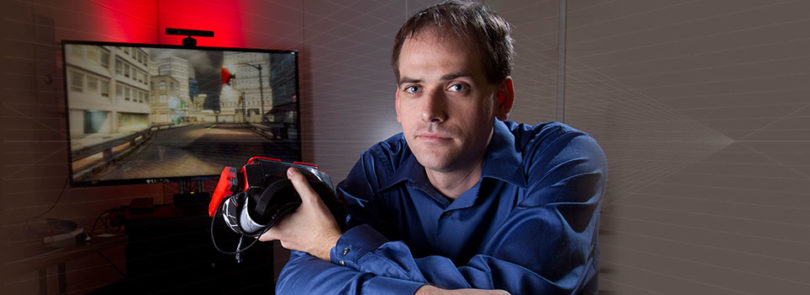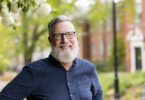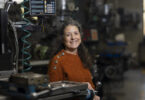Kyle Johnsen, an assistant professor in the College of Engineering, says that both his teaching and research are grounded in the idea that social, context-rich, active and hands-on activities are extremely powerful learning vehicles.
Where did you earn degrees and what are your current responsibilities at UGA?
I earned my B.S., M.S. and Ph.D. in computer engineering from the University of Florida. I am an assistant professor in the College of Engineering and have adjunct status in the department of computer science in the Franklin College of Arts and Sciences. The courses I teach include “Virtual Reality,” “Intro to Computer Systems Engineering,” “Sensor Networks” and “Capstone Senior Design.”
When did you come to UGA and what brought you here?
There were a few reasons. The boundary-less Faculty of Engineering (now the College of Engineering) fit perfectly with my cross-disciplinary research, which is a hybrid of computer engineering, computer science and education research. I actually was jointly funded for my first three years through our partnership with, what was then, the Medical College of Georgia and is now Georgia Regents University. I also had the honor of being one of the first faculty members hired as part of the Faculty of Engineering, which began offering a computer systems engineering degree at the same time I was hired. Finally, the opportunity to be on the ground floor of a new college at a top-tier research institution does not come along very often. It was perfect, though I certainly have had to set aside the Florida versus Georgia rivalry!
What are your favorite courses and why?
Teaching CSCI4830/6830 “Virtual Reality” in the spring is the highlight of my academic year. It’s a multidisciplinary senior-level course in which students learn to design, build and publically demonstrate innovative simulators and virtual experiences. I’ve seen everything from an underwater oil pipeline repair simulator to an augmented reality zombie fighting game. It’s amazing fun and such an incredible artifact for the students to talk about and even take on job interviews.
I also can’t say enough good things about CSE2210 “Introduction to Computer Systems Engineering,” which I co-teach with Takoi Hamrita. She teaches a module on the profession and creativity, and I have students design and build computer systems from the moment they start the CSE program. I’ve never seen so much learning at so many different levels in a single class, and it’s a testament to the opportunities I have as a scholar in building a new degree program.
What interests you about your field?
It has no boundaries. The point of engineering research is to improve our capacity to solve problems. As long as humanity has problems—and we currently have a great deal of them—engineers have the best job security and career outlook. My sub-field, computer engineering, is currently generating a fantastic amount of innovation. The smartphone in everyone’s pockets nowadays is just the tip of the iceberg.
What are some highlights of your career at UGA?
Reflecting back on the five years I’ve been here, highlights include the large number of interdisciplinary collaborations I’ve had and currently maintain at UGA. I started working with our Medical Partnership, but since then, I have started research endeavors with many excellent colleagues within engineering, computer science, journalism, education, veterinary medicine, chemistry, music, theater and business. I’m very grateful that UGA affords me these opportunities and supports them with wonderful interdisciplinary programs that bring us together, such as the Obesity Initiative.
How does your research or scholarship inspire your teaching, and vice versa?
The foundation of my research into building better simulators in education is that social, context-rich, active, hands-on activities are extremely powerful learning vehicles. It would be hypocritical of me to teach my own classes in any other way, and I’ve greatly enjoyed the transition from the lecture-oriented approach (as have my students). Vice versa, my students are constantly giving me new ideas and inspiration. Lately, I’ve recruited all of my research assistants exclusively from my classes.
What do you hope students gain from their classroom experience with you?
Something unique and impressive that they will put on their resume or, better yet, bring with them to an interview.
Describe your ideal students.
They actively challenge me, use me as a resource, take responsibility for their own learning and are highly self-reflective.
Favorite place to be/thing to do on campus is…
I love being in my research lab working with my graduate and undergraduate students. It’s not a sterile, cold environment, but more like a hacking club where we get to innovate every day. I also host a few of my classes in the lab, so I’m in there quite a bit.
Beyond the UGA campus, I like to…
… spend time with my beautiful wife, Erin; our two daughters, Claire and Catherine; and our beloved four-legged family member, Penny, who is a Maltipoo (Maltese-poodle hybrid). I also try to find time for an occasional round of golf or disc golf.
My community/civic involvement includes….
It has taken a lot of effort, but I’ve set up my research lab to be an interactive attraction of sorts for outside groups, especially those that involve school-aged children. It’s incredibly fulfilling to see the wonderment in the eyes of children experiencing virtual reality for the first time.
Favorite book/movie (and why)?
I’m a classic stereotype in this area. I love science fiction and fantasy books and movies. My favorites are probably “The Wheel of Time” book series (Robert Jordan) and the movie “The Fifth Element” (Luc Besson).
Proudest moment at UGA?
Finding out that the College of Engineering was officially approved. I’m extremely proud of the hard work that all of our faculty, students, staff and administrators in engineering and within the Georgia community provide every day to make it a success.
(Originally published Oct. 27, 2013)








